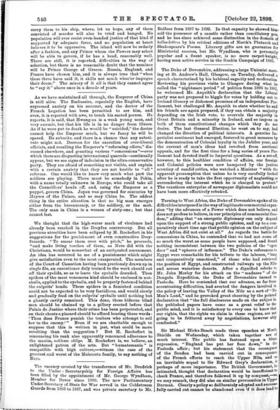The Duke of Devonshire, addressing a large Unionist meet_ ing
at St. Andrew's Hall, Glasgow, on Tuesday, delivered a speech characterised by his habitual sagacity and moderation Reviewing his previous visits to Glasgow during what he called the "nightmare period" of politics from 1886 to 1892, he welcomed Mr. Asquith's declaration that the Liberal party was not prepared to higgle for votes by holding out ta Ireland illusory or dishonest promises of an independent Par- liament, but challenged Mr. Asquith to state whether he and his friends are again prepared, if they can obtain a majority depending on the Irish vote, to overrule the majority in Great Britain and a minority in Ireland, and so impose on both of them constitutional changes which they do not desire. The last General Election, he went on to say, had changed the direction of political interests. A genuine Im- perialist sentiment had emerged, fostered in great measure by the demonstration of Colonial loyalty in the Jubilee year, and the current of men's ideas had revolted from sectional appeals, and for the first time for a long series of years Par- liament had devoted itself to Imperial questions. As a set-off, however, to this healthier condition of affairs, our foreign and Colonial policies were now hampered by the jealous scrutiny of candid critics, who watched a Minister "with the apparent presumption that unless he is very carefully looked after he is ready to take the first opportunity of neglecting or surrendering the interest which he is charged to protect." The vexatious enterprise of newspaper diplomatists could not have been more effectively rebuked.










































 Previous page
Previous page